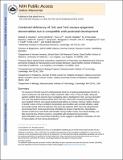Combined Deficiency of Tet1 and Tet2 Causes Epigenetic Abnormalities but Is Compatible with Postnatal Development
Author(s)
Dawlaty, Meelad M.; Breiling, Achim; Le, Thuc; Raddatz, Günter; Barrasa, M. Inmaculada; Cheng, Albert W.; Gao, Qing; Powell, Benjamin E.; Li, Zhe; Xu, Mingjiang; Faull, Kym F.; Lyko, Frank; Jaenisch, Rudolf; ... Show more Show less
DownloadJaenisch_Combined deficiency.pdf (7.493Mb)
PUBLISHER_CC
Publisher with Creative Commons License
Creative Commons Attribution
Terms of use
Metadata
Show full item recordAbstract
Tet enzymes (Tet1/2/3) convert 5-methylcytosine (5mC) to 5-hydroxymethylcytosine (5hmC) in various embryonic and adult tissues. Mice mutant for either Tet1 or Tet2 are viable, raising the question of whether these enzymes have overlapping roles in development. Here we have generated Tet1 and Tet2 double-knockout (DKO) embryonic stem cells (ESCs) and mice. DKO ESCs remained pluripotent but were depleted of 5hmC and caused developmental defects in chimeric embryos. While a fraction of double-mutant embryos exhibited midgestation abnormalities with perinatal lethality, viable and overtly normal Tet1/Tet2-deficient mice were also obtained. DKO mice had reduced 5hmC and increased 5mC levels and abnormal methylation at various imprinted loci. Nevertheless, animals of both sexes were fertile, with females having smaller ovaries and reduced fertility. Our data show that loss of both enzymes is compatible with development but promotes hypermethylation and compromises imprinting. The data also suggest a significant contribution of Tet3 to hydroxylation of 5mC during development.
Date issued
2013-01Department
Massachusetts Institute of Technology. Department of BiologyJournal
Developmental Cell
Publisher
Elsevier
Citation
Dawlaty, Meelad M.; Breiling, Achim; Le, Thuc; Raddatz, Günter; Barrasa, M. Inmaculada; Cheng, Albert W.; Gao, Qing et al. “Combined Deficiency of Tet1 and Tet2 Causes Epigenetic Abnormalities but Is Compatible with Postnatal Development.” Developmental Cell 24, 3 (February 2013): 310–323 © 2013 Elsevier Inc
Version: Author's final manuscript
ISSN
1534-5807
1878-1551